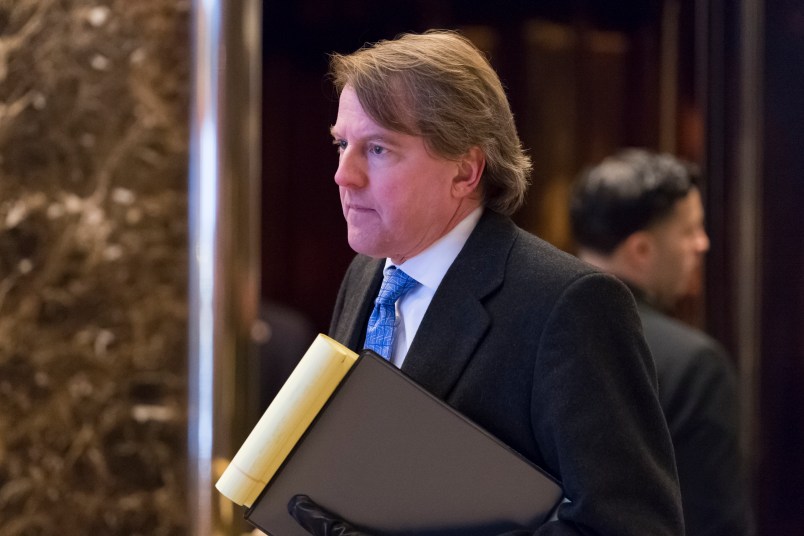Just days after the inauguration, White House Counsel Don McGahn learned—and warned President Donald Trump—that then-national security adviser Michael Flynn had probably violated federal laws, according to a new report out Wednesday.
Foreign Policy reported that the Special Counsel has obtained “records” that reveal McGahn in late January researched the consequences of lying to the FBI and of violating the Logan Act, a centuries-old federal prohibition on private citizens negotiating with hostile foreign governments. The research, conducted with the help of two aides, prompted McGahn to conclude that Flynn had likely committed a crime by discussing sanctions with a top Russian official during the transition, two current administration officials told Foreign Policy.
Most significantly, the records now in the possession of Special Counsel Robert Mueller indicate McGahn “warned Trump about Flynn’s possible violations” for holding those discussions and lying about them to the FBI, according to Foreign Policy.
Legal experts told TPM that such advance notification about Flynn’s potentially criminal acts would significantly bolster the case that the President was trying to obstruct justice when he allegedly asked then-FBI Director James Comey to drop the investigation into Flynn the day after his dismissal from the White House. The obstruction statute requires not only that someone tried to impede an investigation, but had corrupt intent in doing so.
“It basically all goes to what Trump knew when he asked Comey to let the Flynn investigation go,” former FBI counterintelligence agent Asha Rangappa told TPM.
Awareness that Flynn had committed possible federal criminal offenses “really raises the level of knowledge and of what exactly Trump was trying to essentially derail the investigation into,” Rangappa continued.
The White House and Special Counsel Robert Mueller’s office did not return Foreign Policy’s requests for comment.
The White House has maintained, with a slip-up here and there, that Flynn was dismissed solely for lying to Vice President Mike Pence about the content of his December 2016 conversations with Russia’s then-ambassador to the U.S. Administration officials were not moved by warnings then-Acting Attorney General Sally Yates issued to McGahn on Jan. 26 and Jan. 27 about Flynn’s conduct regarding Russia, they said, because Yates failed to convey a sense of urgency and was an Obama administration appointee.
Top Trump aides including Reince Priebus and Sean Spicer even told the press that the legal department conducted a review after McGahn’s meetings with Yates and found that there was nothing wrong with Flynn’s conduct.
A “senior administration official close to McGahn” told Foreign Policy that the White House Counsel felt unfairly scapegoated by these comments, given that he researched Flynn’s possible legal violations after speaking to Yates and passed his warning on to the President.
Still, Trump kept Flynn in office for 18 days after Yates made her first warning to McGahn.
Those are the sorts of decisions that make possible obstruction by Trump seem like “the tail chasing the dog,” former federal prosecutor Steve Miller told TPM.
“You don’t obstruct unless you’re trying to conceal other criminal activity,” Miller added.
Flynn ultimately pleaded guilty on Dec. 1 for lying to the FBI, and acknowledged he is now a cooperating witness for the special counsel. Though he did not admit to violating the Logan Act, both McGahn’s January concerns and Flynn’s court documents send troubling signals for other Trump officials who discussed policy with foreign governments during the transition.
According to Flynn’s statement of offense, two senior transition officials directed Flynn to conduct some of his outreach to foreign governments including Russia. Subsequent reporting has revealed those individuals to be Trump son-in-law Jared Kushner and senior transition aide KT McFarland.
Though no prosecutions have ever successfully been brought under the Logan Act, Rangappa, the former FBI agent, said that few people meet the precise conditions required to prosecute someone under it. She also pointed out that former Trump campaign officials Paul Manafort and Rick Gates were indicted under the Foreign Agents Registration Act, a similarly obscure and under-enforced law. (They have pleaded not guilty to that and various financial crimes charges brought against them by Mueller.)
“You typically don’t have facts that line up exactly with what is a pretty complicated statute,” Rangappa said of the Logan Act. “You have to be privately negotiating with a country that has a dispute with the United States for the purpose of defeating the measure of the United States.”
“So the fact that it hasn’t been used has to do with the fact that most people don’t do that,” she added.







Something about a cover-up being worse than the crime? Sounds as if McGahn’s loyalty to Trump has reached its limit.
It’s self-evident. The answer is “Yes.”
His staff won’t tell him, but maybe someone will mention this cheerful news to Trump in his Twitter feed. It would give him a sense of how life is a rich tapestry. In the morning you’re celebrating how badly you hosed the 99 percent, in the evening you learn the noose continues to tighten.
Lawyer has to research consequences of lying to FBI?
When so much news is focusing on the tax bill, the congressional palace politics (dealing/intrigue to get votes), it is important to keep looking at each new development on this front - and putting it back into the jigsaw puzzle - and consider what is the image that is emerging - what we can tell and what we can (and can’t yet) speculate about.
Thanks you for this piece, Ms. Kirkland. Well done.